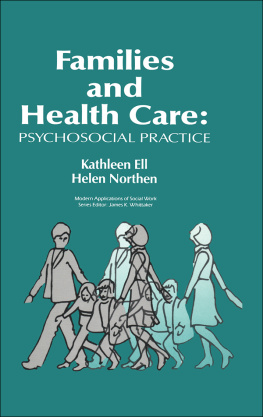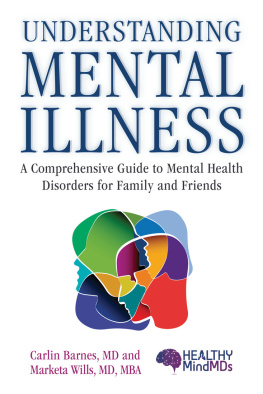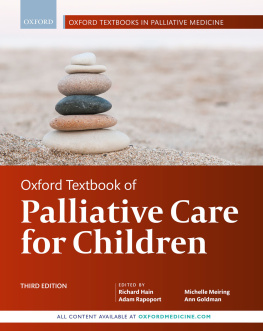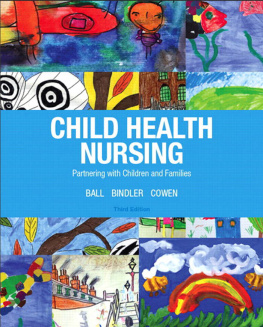Families and Health Care
Psychosocial Practice
First published 1990 by Transaction Publishers
Published 2017 by Routledge
2 Park Square, Milton Park, Abingdon, Oxon OX14 4RN
711 Third Avenue, New York, NY 10017, USA
Routledge is on imprint of the Taylor & Francis Group, an informa business
All rights reserved. No part of this book may be reprinted or reproduced or utilised in any form or by any electronic, mechanical, or other means, now known or hereafter invented, including photocopying and recording, or in any information storage or retrieval system, without permission in writing from the publishers.
Notice:
Product or corporate names may be trademarks or registered trademarks, and are used only for identification and explanation without intent to infringe.
Library of Congress Cataloging-in-Publication Data
Ell, Kathleen Obier, 1940-
Families and health care: psychosocial practice / Kathleen Ell and Helen Northen.
p. cm.(Modern applications of social work)
Includes bibliographical references.
ISBN 0-202-36059-8.ISBN 0-202-36060-1 (pbk.)
1. FamilyMedical carePsychological aspects. 2. SickFamily relationship. 3. FamilyPsychological aspects. 4. Medical social work. I. Northen, Helen. II. Title. III. Series.
IDNLM: 1. Family. 2. Social Work. WA 309 E44f]
RA418.5.F3E35 1990
362.104dc20
DNLM/DLC
for Library of Congress
89-18560
CIP
ISBN 13: 978-0-202-36059-1 (hbk)
From its earliest beginnings, social work practice in health care has recognized the importance of environmental factors as contributing to both the onset and successful treatment of physical illness. A significant part of that environment is the family crucible in which health related attitudes and behaviors are learned and which is, most frequently, the context for healing and renewal. In a work that is at once theoretically satisfying and practical in application, Ell and Northen explore the knowledge base that underpins health related social work interventions. This rich introduction to basic content on coping, stress and adaptation sets the stage for specific chapters on a variety of family centered interventions including assessment and the evaluation of practice. Beginning students of social work in health care as well as seasoned practitioners will find much of value here. The authors communicate their concepts easily and with a judicious use of practice examples. Attention to the research literature is clear and the bibliography is excellent.
Families and Health Care is yet another example of social works recognition and support of family caregiving roles and of the importance of family centered practice. The authors write from a rich and distinguished background in social work practice and research. In part as a result of their work, the social work practice task, in general, will become more responsive to family caregiving responsibilities. This book offers an antidote to the medicalization of health care. It is wholistic in its approach. It respects family values and culture. It is a sensibly written book for a practical profession. Its practice prescriptions call to mind what the great British social policy analyst, Richard Titmuss (1974, p. 150) had in mind when he spoke, in another context, about what a compassionate society can achieve when a philosophy of social justice and public accountability is translated into a hundred and one detailed acts of imagination and tolerance. The kind of family focused social work practice in health care offered by Ell and Northen in this very substantial volume brings us closer to that vision.
James K. Whittaker
The University of Washington
* Titmuss, R. M. (1974). Social Policy, London: George Allen & Unwin Ltd.
Knowledge about families and about families and the health status of individual family members has advanced significantly in recent years. At the same time, trends in the financing and delivery of health care services place increasingly greater caregiving responsibilities on families in the face of illness or disability, but fail to ensure adequate provision of supportive services to assist families. The existing literature, however, is extremely limited in the attention given to the roles of social workers and other health care practitioners in helping families with their health-related tasks and functions. In an effort to be comprehensive, we review the knowledge base that underpins family-health-related interventions as it is represented in theoretical developments, research, social and organizational policies, and practice. In so doing, we present an argument intended to encourage practitioners to enhance their work with families and rise above the many barriers and disincentives to family intervention in health promotion and health care.
In this book, the family is conceptualized as a primary social system interacting with the broader social environmental system. From this perspective, multiple relationships and interactions between families and health and illness are highlighted. Empirical research and clinical observation provide convincing evidence that families influence significantly the health status of individual family members and that the illness of one member often has adverse effects on other members and on family relationships and family functioning. For example, there is compelling evidence of the normative influence of the family on members health beliefs and practices. The family as a source of potential support and of stress is also implicated in the onset and course of illness. On the other hand, when illness or disability strikes a family member, its effects reverberate throughout the family system. Spouses, children, or siblings may experience serious distress and in extreme cases may themselves become ill as a result of this distress. Usual family functioning processes may be adversely affected as well. Close examination also reveals the familys dependence on environmental resources to effectively carry out its health-related roles. On the basis of the overwhelming empirical evidence presented throughout the book, the call for family interventions to assist families in the health promotion and illness response roles is compelling.
The family is commonly regarded as the basic unit of society. Today, there is evidence from all over the world that despite massive social change, the family is also one of the most resilient of social institutions (Kendall, 1988; Reiss & Lee, 1988; Zimmerman, 1980). Family structure is diverse and subject to change over time. Widespread awareness of major changes in families and in family life in recent years has been heightened by discussions in multiple forums ranging from the popular media to national policy debates among social and political leaders and academic scholars.
Demographic data confirm that, indeed, the family is undergoing numerous changes in household structure, role performance, and overall lifestyle (Berlin, 1988; Chilman, 1988a; Macklin, 1988; Masnick & Bane, 1980; Watkins, Menken & Bongaarts, 1987). An emphasis on current forms of family life does not suggest that families did not vary in the past or that families were ever static social structures. To the contrary, family life in the United States has always varied among different sociocultural groups (Fulmer, 1988; Hines, 1988; McGoldrick, 1988; Wagner, 1988a; Woehrer, 1978). Furthermore, family life varies as it moves through developmental transitions over time. A thoughtful consideration of contemporary families and individual health and illness demands, therefore, that we be ever mindful of the rich diversity of this primary social institution, including family variations in structure, lifestyle, and sociocultural practices. Throughout subsequent discussions of theory, research, and policy, we will draw attention to implications of family diversity for the familys health-related functions and tasks. The practice implications of family diversity will also be highlighted (Dillon, 1985).





